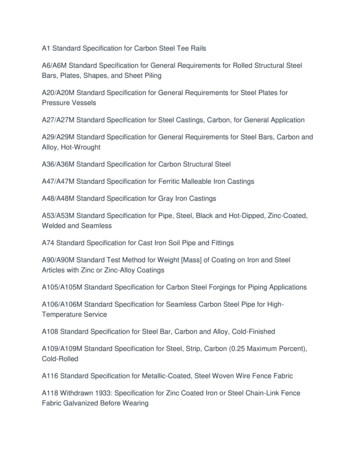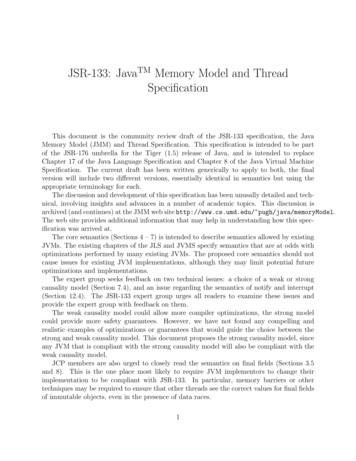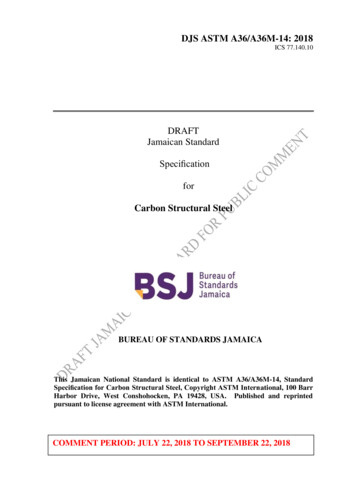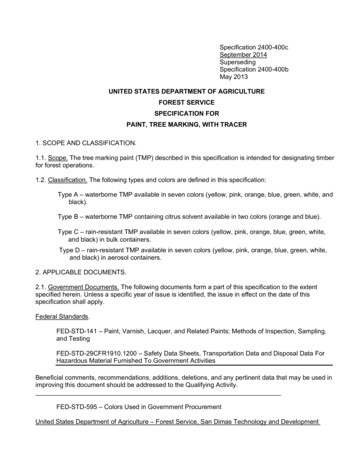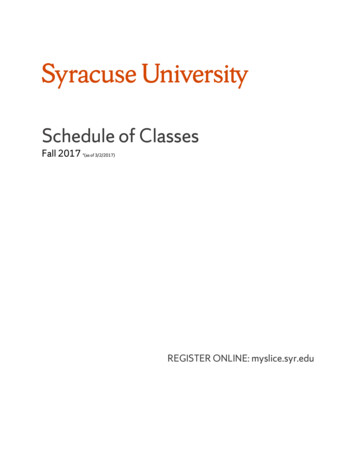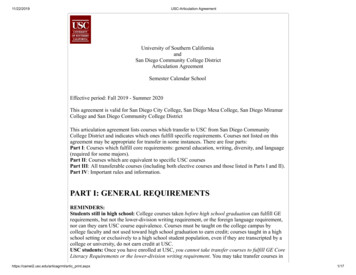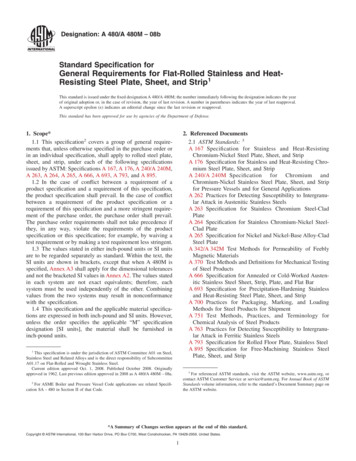
Transcription
Zagazig UniversityFaculty of NursingProgram and Courses specification ofPsychiatric and Mental HealthNursing(Doctorate degree)2091-2022
First-term Doctorate
Program SpecificationA- Basic Information1-Program Title:2Program Type:3-Department(s):4Coordinator:5-External Evaluator :6-Program Specification ofPsychiatric and Mental HealthNursing (Doctorate degree)Single MultipleDoublePsychiatric and Mental HealthNursing DepartmentProf. Dr. Amal MohamedEldakhakhneyProf .Dr. Sorya RamadanDr . Nagda Mohamed El masryProf .Dr. Neveine mostafaLast date of program specificationapproval:2013B- Professional Information:1. Program Aims :Establishing continuous work on increasing the body of knowledge of studentown specialty, implementing systematic, critical analysis in integrating her specialtywith different knowledge related to psychiatric nursing, developing an in depthawareness of health problems, recent issues trends theories pertaining to psychiatricnursing, understanding mental health nursing skills ,practice and workcollaboratively as a team to make appropriate decisions related to psychiatricnursing, showing perfection in utilization &conduction of scientific nursing researchwhich are based on evidence and using information technology in away that servesprofessional practices.Intended Learning Outcomes (ILOs)a- Knowledge and Understanding :a1- Discuss understanding of the theories and knowledge ofbasic sciences, evidence based practices related topsychiatric nursing in order to make professionaljudgment that will help in caring for patients' withmental health problems.
a2- Discuss appropriate knowledge that enhance, modify,support and promote the mental health of patients andtheir families in various environmental residences.a3- Discuss the legal and ethical issues pertaining topsychiatric nursing.b-a4-recognize of ethical and legal principles that supportdiagnostic and management decision of careA5-Identify the principles of quality in the context ofpsychiatric nursing.A6-Discuss the basic concept and application of eachtheories presented.Intellectual Skills:b1- Analyze and assess information for obtaining inductionand deduction reasoning pertaining to psychiatricnursing.b2- Solve mental health problems according to availableresources.b3- Formulate nursing research studies and increaseknowledge about the outcomes of psychiatric nursing.b4- Estimate risks in the professional practices.b5- Conduct planning for the development of professionalskills in psychiatric mental health nursing.b6- Take decision to make clinical judgment pertaining tomental health problems.c-b7- Provide guidance and counseling which are based onevidence regarding the management of the health andillness condition.b8- Evaluate mentally ill patients successfully bymanipulating one or more theoretical approach.Professional and practical skills:c1- Show perfection of basic and recent professional skillsin psychiatric nursing.c2- Write and assess professional reportsc3- Assess and develop methods and tools already utilizedin psychiatric nursing.
c4- Utilize advanced technological ways for servingprofessional skills in own specialty.c5- Plan for the development of professionalpractice and other skills.d- General and transferable skills:d1- Relate effectively with different forms ofcommunicationd2- Utilize information technological methods to serve,develop &enhance her professional practice.d3- Manage effectively scientific meeting and show abilityto manage time properly.d4- Motivate others learning and assess their performance.d5- Develop the ability to work in a team and lead teameffectively.d6- Reinforce self assessment and continuous education.e-Attitude skillsBy the completion of he course the student should be able toE1- Appreciate and promotes patient rights to autonomyE2E3-,respect ,privacy ,dignity and access to informationE2-values her role as a model for less experiencednursing care providers and nursing students.E3-E3-respects and encourages the patients participationin decision about health care services.3- Academic StandardsThe faculty adopted National Academic Standard (NARS) for post graduatestudies, which follow the national authority for quality assurance and accreditationof education, February / 2009.4- The BenchmarksNot applicable
5- The structure and contents of the program :5.1. Program duration : 32 weeks5.2. Program structure: 2 semesters- .%No.%No.%240hours :- CreditRequiredhours:- Credit hours of basic60sciences courses :- Credit hours ofsocial/humanities sciencescourses:- Credit hours of specialized40courses :- Credit hours for othercourses:- Practical field training: maternity hospital at zagazig university hospitals- Program levels (in credit hours system) : . 5.3. Program levels (in credit hours system) :Level 1 : Required to pass . Unit as follow : Required Optional . Elective .Level 2: Required to pass . Unit as follow : Required Optional . Elective .Level 3: Required to pass . Unit as follow : Required Optional . Elective .Level 4: Required to pass . Unit as follow :
Required Optional . Elective .
6- Program Courses :6.1. Level / in program .a. ElectiveCode455467461473479CodeCourse TitleUnitsIssues & recent trends innursingNursing seminar in thearea of specific specialtyNursing seminar in thearea of general specialtyNursing seminar in thearea of general specialtyNursing seminar in thearea of specific specialtyb- ExtraCourse TitleUnitsSemester: weekly hoursLectures Practical Exercises33-3-2-4-weekly hoursLectures Practical Exercisesc- RequiredCodeCourse TitleUnitsweekly hoursLectures Practical Exercises* Repeat for all next levels / terms7- Program admission Requirements for: (Regulations- Courses - )The student should hold master degree in specialty course or related specialties from a university in the Arab Republic of Egypt at least agood grade or an equivalent degree from a college or a scientificinstitute last recognized by the Supreme Council of Universities.Registration begins from first Jun to 1st august. Pass an English language (TOEFL) with minim score of 500. Full time students are allowed to be enrolled at least for one year afterthey had master degree.
8- Methods of the Assessment of the learning target output :No. Method123Learning target outputWrittenexam 60%Knowledge &understanding ,intellectualexaskillsOral exam 40 %Transferable &intellectual skillsFormative exam: SemesterTransferable ,professional & practicalwork (Seminars 20 %skills,presentation 40 % ,clinicalfield work 20 % )in additionto thesis 40 %9- Methods of the program evaluation:No.Evaluator123454-Method1-Senior candidateQuestionnaire2-AlumniQuestionnaireSta3- StakeholderQuestionnaire(Structuredinterview)4 - External evaluatorQuestionnaire5- Other methodsSample70-100%70-100%30-50%Not yetProgram Coordinator: Amal Mohamed EldakhakhnySignature:Date:
University / Academy: ZagazigFaculty / Institute: NursingDepartment: Psychiatric Mental Health NursingModel (12)Course specification for Doctorate Degree1-Course InformationCode : 461Course name:Nursing seminars in thearea of generalpsychiatric nursingDoctorate Degree:First semesterSpecialty: Doctorate degree of Number of studied hours:psychiatric and mental health Theory : 48hspractice nursingAimed at acquiring advanced Knowledge concerningnursing care for patient with psychiatric disorders.3- Intended Learning Outcomes of Course (ILOs)2-Course AimsA.1.Discuss human response to CBTA.2. Enumerate the various theories that involved over theandunderstanding years to describe family therapy.A.3. Explain recent trends in CBT.A.4. Discuss different types of stress management.A.5.Describe recent trends in the management ofpsychiatric problems.A.6.Identify techniques of motivational interviewing.A.7.Describe appropriate management of holistic care.B-Intellectual B.1 Classify types of psychotherapy.B.2. Select the plan of management used in commonskillspsychiatric disorder.B.3. Analyze methods of solving psychiatric problems.C-Professional C. 1- show in presentation the recent modalities used inmanagement of common psychiatric condition.skillsC. 2- Demonstrate the ability to establish effective workingrelationships with others and observe and evaluate workingpractices.C.3 Analyze multidisciplinary planning and theimplementation of nursing intervention related to stress.A-Knowledge
D-GeneralskillsE- Attitudeskills4-Coursecontent5-Teachingand learningmethodsC.4 Provide psycho education for psychiatric patients.D.1. Manage changes and responds to changing demands.D.2. Enhance working with a team spirit.D.3. Demonstrate appropriate professional attitude andbehavior in different health settings.By the completion of the course the student should be abletoE1- Appreciate and promotes patient rights to autonomy,respect ,privacy ,dignity and access to informationE2- Values her role as a model for less experienced nursingcare providers and nursing students.E3 -Respects and encourages the patients' participation indecision about health care services.1- Cognitive Behavior Therapy2- Emotional intelligence3- Family therapy4- Holistic Approach in Care5- Motivational Interviewing6- Stress Management- Group discussion- Seminar- Field studyNot applicable6-Teachingand learningmethods ofdisables7- Student evaluationA-Methods of Written examinationevaluationOral examinationat the end of the courseTimescore%MarksFinal written6060distributionOral exam40408-List of studied books and referencesNot applicableA-Notes1-Beck JS. (2011): Cognitive Behavior Therapy: BasicsB-Requiredand Beyond. 2nd ed. New York, NY: Guilford Press.books2- Wanda. K.M. (2015): Johnson’s Psychiatric Mental
C-SuggestedbooksD-JournalsHealth Nursing. 6th ed., Lippincott, Williams andWilkings, New York.3- Boyd, M.A., & Nihart, M.A. (2016): PsychiatricNursing. Philadelphia New York. Lippincott comp.1- Carlat DJ. (2011): The Psychiatric Interview. 3rd ed.Philadelphia, PA: Lippincott Williams & Wilkins.1- Lehman AF, et al. (2014). Practice guideline for thetreatment of patients with schizophrenia, second edition.American Journal of Psychiatry, 161(2, Suppl): 1-56.2- American Nurses Association (ANA). (2011): Nursingworld website. Online Health & Safety Survey.3- Hamilton, S., & Irving, P. (2013): Can counseling takeplace in acute clinical mental health?. Nursing Times.net.4- Harris, K.J., Kacmar, K.M., & Zivnuska, S. (2017):An investigation of abusive supervision as a predictor ofperformance and the meaning of work as a moderator of therelationship. Leadership Quarterly, 18, 252– 263.5- Gallagher, S. (2015): Stress management. VitalityMagazine, 27 June. Located at: http://www.arthritis.org/E-Facilities for 1-Computer.learning2-Data show.Professor of Course:Prof. Dr/ Hanaa HamdyHead of Department :Dr/ Hanaa Hamdy
University / Academy: ZagazigFaculty / Institute: NursingDepartment :Psychiatric Mental Health NursingCourse Nursing seminars in the area of generalName psychiatric nursing 1st termCode 461NameModel (12)Knowledge and skills matrix benefiting from the Studied courseStudy weeksCourse Content1- Cognitive BehaviorTherapy2- Emotional intelligence3- Family therapy4- Holistic Approach inCare5- MotivationalInterviewing6- Stress ManagementProfessor of Course:Prof. Dr/ Hanaa fessionalskillsC1,C2Transferable andGeneral skillsD1,D24-67-9E1 ,E2,E3A3, A5A2B3B1C2C1, C2D1, D3D1, D2E2, E3E1,E2 ,E310-12A7B3C1, C2D1,D3E1, E2, E313-14A6B3C1, C2D2, D3E1 ,E2,E315-16A4B2C3, C4D2, D1E1 ,E2,E3Head of Department:Prof. Dr/ Hanaa HamdyAttitude skills
Course Specifications1- Basic informationCode : 467stTitle : nursing seminars in the Level :1 Doctorate degreearea of specific psychiatricmedicineCredit hours :Theoretical : 64hsProgram(s) on which the course is given : psychiatric medicineMajor or minor element of programDepartment offering the programDepartment offering the courseDate of specification approvalAcademic year:::::Practical :Minorpsychiatric medicinepsychiatric medicine2018-20192- Overall Aims of Course This course aims to Providing the students withnecessary knowledge and attitude concerning patient with psychiatric disordersand recent trends in treatment modalities.3- Intended Learning Outcomes of Course (ILOs)a-Knowledge and Understanding :By the completion of this course the student should be able toA1Identify the different types of schizophrenic disorder.A2Describe advanced modalities in assessment ofA3A4b-14schizophrenia.Discuss anxiety and ADHD disorders.Explain ADHD disorders, recognize its causes; categorize its types andtreatment modalities.Intellectual SkillsBy the completion of this course the student should be able toB1-c-patient withB2-Understand differential diagnosis in MOOD disorders andschizophrenic disorder .Classify types, causes anxiety disorders and schizophrenic disorder.B3-Summarize recent modalities in management of ADHDB4-Classify OCD disorder.B5-Discuss trends in AUTISM treatment .Professional and practical skillsBy the completion of this course the student should be able to
c1-c2d-The course has no practical hours; however, student could presentalgorithm in recent modality of assessment and management of somepsychiatric disorders.Determine advanced instruments or tools that are used in patientassessment.General and transferable skillsBy the completion of he course the student should be able tod1Use of effective and different methods of Communication skill whendealing with patient with psychiatric disorders.D2D3Manage changes and responds to changing demands.Collaborate effectively with other colleagues in management ofpsychiatric disorders.D4Act as advocate for client, families and groups in psychiatric mentalhealth setting.EAttitude skillsBy the completion of the course the student should be able toE1E1- Appreciate and promotes patient rights to autonomy ,respect ,privacy,dignity and access to informationE2Values her role as a model for less experienced nursing care providersand nursing students.E3Respects and encourages the patients participation in decision abouthealth care services.4- Course Contents:15
WeekTopicSCHIZOPHREIA1-3ANXIETY 3-1516MOOD DISORDERSNo. of 44444Oral-examFinal Exam5- Teaching and learning methods :5.1Problem- based learning,5.2case- based seminars5.3Data show, films, assignments5.4Seminar6- Student Assessment :A- Assessment MethodA.1Semester workA.3Final - term ExaminationB- Time ScheduleSemester workFinal - term ExaminationWeek : through semesterWeek : at the end of semesterC- Grading systemFinal - term ExaminationSemester work% 80% 207- List of References16
A - Course NoteB - Required Books (Text Books)C - Recommended BooksD - Periodicals, Web Sites, etcNot applicable- Varcarolis , M.E. (2008). Foundationof psychiatric Mental Health Nursing(3rd ed.) London : Saunders Comp .- Fortinash, K.M. & Holoday-Worret,P.A., (2009). Psychiatric MentalHealth Nursing. (2nd ed.), St. Louis,Boston, London, Tokyo: MosbyComp- Tasman AG, Toldfinger C andKaufamann D (2009): Review ofpsychiatry. American PsychiatricPress, Washington.- Akil,H.,Owen,c.,Gutstein,H.,Taylor,L., And Watson, S.(2006).Overview and current issues.DrugAlcohol Depend . New York.- Cardena E and Spiegel D (2009):Dissociativereactions.OxfordUniversity Press.- www.psychatric medicine.comwww.AmericanJournalpsychiatry.com8- Facilities required for teaching and learning1. Computer.2. Data show.Course Coordinator:Head of DepartmentDate:17//Dr/ Nelly Raafat - Dr/Amira FouadDr: Eman Elsafyof
University / Academy: ZagazigFaculty / Institute: NursingDepartment :Psychiatric Mental Health NursingCourse nursing seminars in the area of specificName psychiatric medicine 1st termCode 467NameModel (12)Knowledge and skills matrix benefiting from the Studied courseStudy weeksCourse ContentSCHIZOPHREIAANXIETY DISORDERSAUTISM SPECTRUMDISORDERADHDOCDMOOD DISORDERSProfessor of , C2C1, C2Transferable andGeneral skillsD1,D2, D4D1, D3D1, D2AttitudeskillsE1 ,E3E2, E3E1, ,E3A3, A4A3A2,B3B4B1C1, C2C1, C2C1, C2D1,D3D2, D4D2, D1E1, E2, E3E1 ,E3E2, E3Head of Department:
Course Specifications1- Basic informationCode : 455stTitle : Issues & recent trends in Level :1nursingCredit hours :Program(s) on which the course is givenMajor or minor element of programDepartment offering the programDepartment offering the courseDate of specification approvalAcademic yearTheoretical : 48 hrsPractical :: Issues & recent trends in nursing: Minor: Several: Psychiatric and mental health nursing.: 10/2014: 2018-20192- Overall Aims of Course This course aims: Providing the students withnecessary knowledge, skills & attitudes that enable them to provide qualitynursing care and to be aware of the new trends in nursing education, practice,and research.3- Intended Learning Outcomes of Course (ILOs)a-Knowledge and Understanding :By the completion of this course the student should be able toA1- - Identify types of plagiarism.A2- - Discuss principles of research ethics.A3- Identify Stages of motivational interviewing.A4- - Explain Health belief model and self concept.A5- - Enumerate Steps in avoid plagiarism.A6- - Discuss Principles of milieu therapy.A7- - Explain importance of psychosocial rehabilitation and health beliefmodel.b-19Intellectual SkillsBy the completion of this course the student should be able toB1- Differentiate between research ethics conceptsB2- Discuss self-concept and health belief model.B3- Support the Uses for milieu therapy.B4- Interpret Skills of psychosocial rehabilitation.B5- Discuss hazards of plagiarism
c-Professional and practical skillsBy the completion of this course the student should be able toC1- Formulate Holistic Approaches to Care and the Integration ofC2C3-d-Knowledge.Demonstrate the Challenges of avoiding plagiarism.Assist with the management of psychosocial rehabilitation formentally ill patientsInterpret the health belief model in psychiatric nursing.Apply Challenges of implementing research ethics.Select and apply skills to rise of self-concept.C4C5C6General and transferable skillsBy the completion of he course the student should be able toD1- -Use of effective and different methods of communication skills inD2D3providing palliative care to dying patients.-Enhance working with a team spirit and lead them effectively.- Demonstrate Skills of motivational interviewingE- Attitude skillsBy the completion of the course the student should be able toE1- Appreciate and promotes patient rights to autonomy ,respect,privacy ,dignity and access to informationE2-Acting as a role model and mentor for less experienced nursingcare providers and nursing students.E3-Communicate with patient respectfully regarding their differentvalues, cultures, intellectual levels and emotional state.4- Course Contents:20
No. of hoursTopicWeekLectureHealth belief sPlagiarismPsychosocial Rehabilitation7-1011121516Research Ethics3hrs3hrs3hrs3hrs3hrs3hrsSelf ConceptMilieu TherapyOral-examFinal Exam5- Teaching and learning methods :5.15.25.35.45.55.6LectureGroup discussionSeminarInteractive presentation.Case studyNursing care plan.6- Student Assessment :A- Assessment MethodA.1 Clincal area evaluation through –written work tools (nursing care plan.Casestudiesaboutdifferentpsychiatric patients)A.3 Final - term ExaminationB- Time ScheduleClinical area evaluation through – writtenWeek : work tools (nursing care plan. Case studiesabout different psychiatric patients)Final - term ExaminationWeek : 16C- Grading systemFinal - term ExaminationSemester workTotal7- List of References2180%20%100%practicalTutorial/Practical
A - Course NoteB - Required Books (Text 1-Townsend,M.C. (2017): Psychiatricmental health nursing- concepts of care. (7thed.). Philadelphia: F.A Davis Company.2- LoBiondo-Wood, G., & Haber, J. (2017):Nursing research: Methods and CriticalBooks)Appraisal for Evidence-Based PracticeC - Recommended BooksD – Journals(9th ed.). Philadelphia: Mosby3-Buppert, C. (2012): Nurse Practitioner’sBusiness Practice and Legal Guide. 4th ed.Sudbury, MA: Jones & Bartlett Publishers.1- Sadock B J(2009):Concise textbook ofclinical psychiatry. Cambridge university,united state of America.3rd ed.(2)698-700.2- Dossey BM. 2013: Nursing: integral,integrative, and holistic—local to global. In:Dossey BM, Keegan L, eds. HolisticNursing: A Handbook for Practice. 6th ed.1- Miller, W.R. & Rollnick, S. (2009). Ten thingsthat Motivational Interviewing is not. Behavioraland Cognitive Psychotherapy, 37, 129--‐140.2- Cavazotte, F., Moreno, V., & Hickmann, M.(2012). Effects of leader intelligence, personalityand emotional intelligence on transformationalleadership and managerial performance. TheLeadership Quarterly, 23, 443-455.8- Facilities required for teaching and learning:Course Coordinator: prof. Dr /Hanaa Hamdy Ali – Dr/ Hanem AhmedHead of DepartmentDate:22//Prof. Dr /Hanaa Hamdy ali
University / Academy: ZagazigFaculty / Institute: NursingDepartment :Psychiatric Mental Health NursingCourse Issues & recent trends in nursing 1st termNameCode 455NameStudy weeksModel (12)Knowledge and skills matrix benefiting from theStudied lskillsC4Transferable andGeneral skillsD1,D2, D3AttitudeskillsE1 ,E3Plagiarism4-6A1, A5B5C2D1, D3E2, E3Psychosocial Rehabilitation7-10A7B4C3D1, D2E1, ,E3Research Ethics11A2,B1C5D1,D3E1, E2, E3Self-Concept12-15A4B2C6D2, D3E1 ,E3Milieu Therapy16A6B3C1D2, D1E2, E3Course ContentHealth belief modelProfessor of Course:Dr /Hanaa Hamdy ali – Dr/23Head of Department:Dr /Hanaa Hamdy ali
Second-term Doctorate24
University / Academy: ZagazigFaculty / Institute: NursingDepartment :Psychiatric Mental Health NursingModel (12)Course specification for Doctorate Degree1-Course InformationCode : 473Course name:Nursing seminars in thearea of generalpsychiatric nursingDoctorate Degree:Second semesterSpecialty: Doctorate degree of Number of studied hours:psychiatric and mental health Theory : 48hspractice nursingAimed at acquiring advanced Knowledge concerningnursing care for patient with psychiatric disorders.3- Intended Learning Outcomes of Course (ILOs)2-Course AimsA.1.Discuss human response to crisisA.2. Enumerate the various theories that involved over theandunderstanding years to describe different psychiatric disorders.A.3. Discuss different types of personality disorders.A.4.Describe recent trends in the management ofaggression.A.5.Identify orem's theory.A.6.Describe appropriate management for personalitydisorders.B-Intellectual B.1 Classify types, causes and measures of assessment ofaggressive behavior among psychiatric patientsskillsB.2. Select the plan of management used for patients withPersonality disorders and crisisB.3. Analyze psychiatric problems identification, solvingand behave wisdom in urgent situation.C-Professional C. 1 show in presentation the recent modalities used inCrisis.skillsC. 2 Demonstrate the ability to establish effective workingrelationships with others and observe and evaluate workingpractices.C.3 Apply nursing theories in care of mentally ill patients,A-Knowledge25
D-GeneralskillsE- Attitudeskills4-Coursecontent5-Teachingand learningmethodsC.4 Provide psycho education for patients with Personalitydisorders.D.1. Manage changes and responds to changing demands.D.2. Enhance working with a team spirit.D.3. Demonstrate appropriate professional attitude andbehavior in different health settings.By the completion of the course the student should be abletoE1- Appreciate and promotes patient rights to autonomy,respect ,privacy ,dignity and access to informationE2- Values her role as a model for less experienced nursingcare providers and nursing students.E3 -Respects and encourages the patients' participation indecision about health care services.7- assertiveness8- aggression9- Crisis intervention10Orem theory11Peplau's theory12Personality disorders- Group discussion- Seminar- Field studyNot applicable6-Teachingand learningmethods ofdisables7- Student evaluationA-Methods of Written examinationevaluationOral examinationat the end of the courseTimescore%MarksFinal written6060distributionOral exam40408-List of studied books and referencesNot applicableA-Notes1-Beck JS. (2011): Cognitive Behavior Therapy: BasicsB-Requiredand Beyond. 2nd ed. New York, NY: Guilford Press.books2- Wanda. K.M. (2015): Johnson’s Psychiatric MentalHealth Nursing. 6th ed., Lippincott, Williams and26
C-SuggestedbooksD-JournalsWilkings, New York.3- Boyd, M.A., & Nihart, M.A. (2014): PsychiatricNursing. Philadelphia New York. Lippincott comp.1- Carlat DJ. (2016): The Psychiatric Interview. 3rd ed.Philadelphia, PA: Lippincott Williams & Wilkins.1- Lehman AF, et al. (2014). Practice guideline for thetreatment of patients with schizophrenia, second edition.American Journal of Psychiatry, 161(2, Suppl): 1-56.2- American Nurses Association (ANA). (2011): Nursingworld website. Online Health & Safety Survey.3- Hamilton, S., & Irving, P. (2013): Can counseling takeplace in acute clinical mental health?. Nursing Times.net.4- Harris, K.J., Kacmar, K.M., & Zivnuska, S. (2017):An investigation of abusive supervision as a predictor ofperformance and the meaning of work as a moderator of therelationship. Leadership Quarterly, 18, 252– 263.5- Gallagher, S. (2015): Stress management. VitalityMagazine, 27 June. Located at: http://www.arthritis.org/E-Facilities for 1-Computer.learning2-Data show.Professor of Course:Head of Department :Pof. Dr/ Hanaa Hamdy - Dr/Hanem Ahmed prof. Dr/ Hanaa Hamdy27
University / Academy: ZagazigFaculty / Institute: NursingDepartment :Psychiatric Mental Health NursingCourseNameCodeNameNursing seminars in the area of general psychiatricnursing 2nd term473Course Content1- assertiveness2- aggression3- Crisisintervention4- Orem theory5- Peplau's theory6- 5-16Professor of Course:28Model (12)Knowledge and skills matrix benefiting from theStudied 2,A5B3C2A4B1C2A1B2C1, C2A2A2A3,A6B3B3B2C2, C3C2, C3C4Transferableand GeneralskillsD1, D2, D3D1, D2, D3D1, D2, D3Attitude skillsD2, D3D2, D3D1, D2, D3E1, E2, E3E1 ,E2,E3E2, E3E1,E2 ,E3E1 ,E3E1 ,E2,E3Head of Department:
Course Specifications1- Basic informationCode : 479ndTitle : nursing seminars in the Level :2 Doctorate degreearea of specific psychiatricmedicineCredit hours :Theoretical : 64hsProgram(s) on which the course is given : psychiatric medicineMajor or minor element of programDepartment offering the programDepartment offering the courseDate of specification approvalAcademic year:::::Practical :Minorpsychiatric medicinepsychiatric medicine2018-20192- Overall Aims of Course This course aims to Providing the students withnecessary knowledge and attitude concerning patient with psychiatric disordersand recent trends in treatment modalities.3- Intended Learning Outcomes of Course (ILOs)a-Knowledge and Understanding :By the completion of this course the student should be able toA1- Identify the different cognitive disorders in old age.A2- Describe advanced modalities in assessment of patient with commonA3A4A5b-eating disorders.Discuss amnestic disorders.Explain impulse control disorders, recognize its causes; categorize itstypes and treatment modalities.Describe assessment, diagnosis and treatment of complex mentaldisorders uniquely occurring in late life.Intellectual SkillsBy the completion of this course the student should be able toB1- Understand differential diagnosis in amnestic disorders.B2- Classify types, causes cognitive disorders.B3- Summarize recent modalities in management of common eatingdisordersB4- Classify different psycho geriatric and impulse control disordersB5- Discuss trends in geriatric psychiatry .c-29Professional and practical skillsBy the completion of this course the student should be able to
C1-The course has no practical hours; however, student could presentalgorithm in recent modality of assessment and management of somepsychiatric disorders.C2- Determine advanced instruments or tools that are used in patientassessment.d-General and transferable skillsBy the completion of he course the student should be able toD1Use of effective and different methods of Communication skill whendealing with patient with psychiatric disorders.D2D3Manage changes and responds to changing demands.Collaborate effectively with other colleagues in management ofpsychiatric disorders.D4Act as advocate for client, families and groups in psychiatric mentalhealth setting.EAttitude skillsBy the completion of he course the student should be able toE1Appreciate and promotes patient rights to autonomy ,respect ,privacy,dignity and access to informationE2Values her role as a model for less experienced nursing care providersand nursing students.E3Respects and encourages the patients participation in decision abouthealth care services.4- Course Contents:WeekTopicNumber of hoursLecture1-3Cognitive disorders4444-6Amnestic disorders44430PracticalTutorial/Practical
7-10Eating disorders44411-13Geriatric psychiatry44414-16Impulse control disorders444Final Exam5- Teaching and learning methods :5.1Problem- based learning,5.2case- based seminars5.3Data show, films, assignments5.4Seminar6- Student Assessment :A- Assessment MethodA.1Semester workA2Oral ExaminationA.3Final - term ExaminationB- Time ScheduleSemester workFinal - term ExaminationWeek : through semesterWeek : at the end of semesterC- Grading systemFinal - term ExaminationSemester work% 80% 207- List of ReferencesA - Course No
nursing. b2 - Solve mental health problems according to available resources. b3 - Formulate nursing research studies and increase knowledge about the outcomes of psychiatric nursing. b4 - Estimate risks in the professional practices. b5 - Conduct planning for the development of professional skills in psychiatric mental health nursing.
